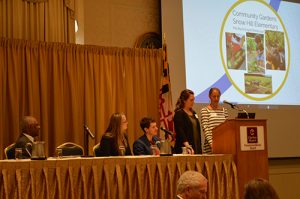
OCEAN CITY – Discussions on various community-based initiatives took center stage at the Worcester County Health Department’s annual public health conference this week.
On Wednesday, health department officials, county agencies, and community members and organizations met at the Clarion Fontainebleau Resort Hotel in Ocean City to discuss community-based initiatives recently implemented in Worcester County and the role they have played in public health.
The conference featured remarks from speakers and panel discussions that focused on the health department’s four community health priority areas – promoting healthy lifestyles, strengthening behavioral health, improving access to care and supporting healthy youth.
Keynote speaker Dr. Howard Haft, deputy secretary for public health at the Maryland Department of Health, said improving a population’s health starts with understanding the conditions in which a community lives, works and ages.
“As we reinvent public health, as we bring public health back into focus again, we have to begin to understand that in order to improve the health of a population we need to understand what drives the health of a population in the wrong direction,” he said. “This is not anymore what medicine you take, it’s all of these other things.”
Haft said it was social determinants, such as food security, economic stability, support systems and quality of care, for example, that influenced public health.
“We want to improve the health of populations, not just one person’s health …,” he said. “Maryland is in a great place in this narrative.”
In Worcester County, the health department has partnered with various organizations, government entities, businesses and community members to support initiatives that improve the fundamental aspects of public health.
In a panel discussion on promoting healthy lifestyles, for example, Alysson DuPont, vice president and director of human resources for Taylor Bank, said the bank’s partnership with the health department has enabled its employees to improve their health through a Just Walk worksite wellness program.
“We had about 40 employees that signed up for the Just Walk program and over 20 participated in a new pilot program using the app for self-reporting,” she said. “One of our employees in a three-month span exceeded 386,000 steps. Not only was that huge, but she lost 30 pounds.”
Fred Webster, Worcester County’s emergency services director and co-chair for the Opioid Intervention Team, credited partnerships with the health department, board of education, law enforcement and other agencies for behavioral health improvements. He applauded the team’s commitment to fight the opioid crisis.
“This group has worked hard to help stem the opioid epidemic in Worcester County,” he said. “As of yesterday, I’m happy to say while we are not at zero for fatal or non-fatal heroin overdoses in the first part of 2018, we are in better standing than the rest of the Eastern Shore counties.”
In another panel discussion on supporting healthy youth, Stephen Decatur Middle School Principal Lynne Barton said partnerships with the health department and funding from the Ocean City-Berlin Optimist Club have allowed students to utilize an app to anonymously report bullying and other inappropriate or alarming behavior.
Through the app, Barton said school administrators and counselors can respond immediately to situations and provide support.
“It gives them a voice,” she said. “We have had 193 reports this year and a lot of them go to our counselors.”
Jennifer LaMade, director of planning, quality and core services at the health department, stressed the importance of partnerships in local communities and the roles they have played in improving public health.
“We really believe we need a complete community partnership with public health to change our future,” she said.


